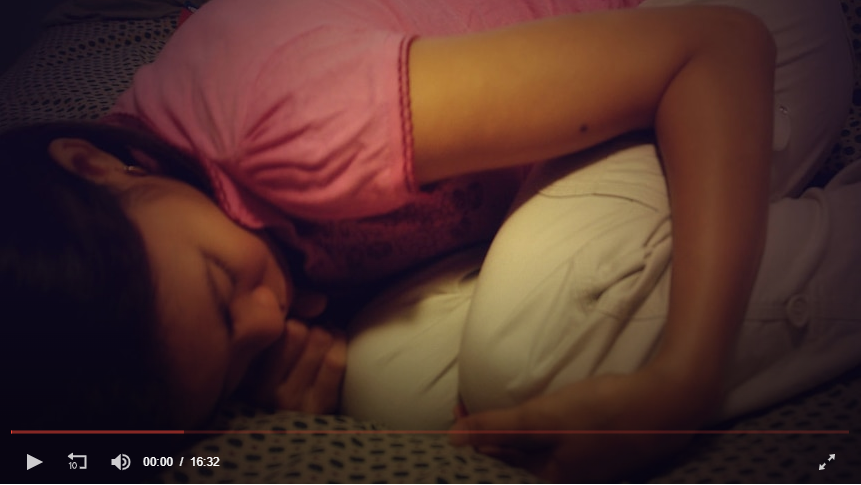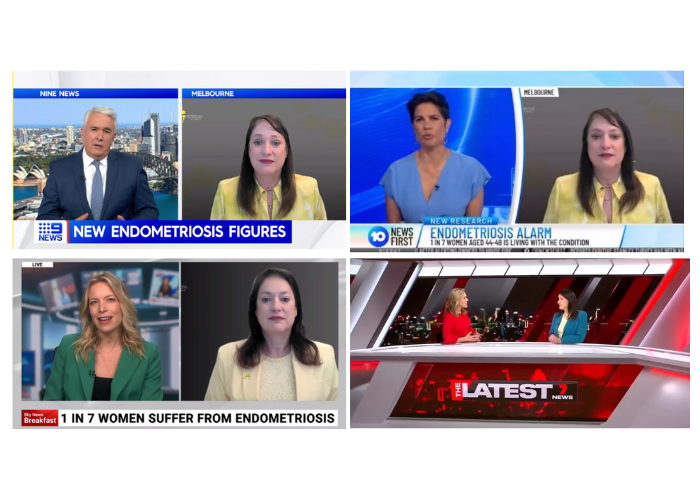On Mornings with Cathie Schnitzerling
ABC Queensland, 24th May 2022
Cathie Schitzerling 0:02
You’ve probably heard of a disease called endometriosis. And you probably might know someone who lives with it as well. Endometriosis affects around one in nine people assigned female at birth, and on average, it can take up to seven to 10 years to diagnose. As a society, we know a lot more about endo today than what we did say 10 or 20 years ago, but there’s still a lot to be done. A group of endo patients and advocates are calling for a change to the National Guideline, which have been put together by the Royal Australian and New Zealand College of Obstetricians and Gynaecologists. These guidelines are to ensure that surgeons operating on endometriosis patients have more specialised training. Professor Jason Abbott is a fellow of the college, and he led the working group which designed the guidelines. He’s also a professor of obstetrics and gynaecology at the University of New South Wales. Let’s start with the easy question first, what is endometriosis?
Prof. Jason Abbott 1:10
Good way to start, I think. Endometriosis is a really common condition where tissues similar to the lining of the uterus grows outside of the uterus, and it can cause a whole variety of symptoms. But principally, it can cause pain, infertility, and then general symptoms as well. So often, people present with things like headache, fatigue, bloating, and it has a really dramatic effect on people’s lives. And about 11.4% of people in Australia are diagnosed with endometriosis by the age of 44. So it’s incredibly common. One in nine people will have endometriosis in Australia,
Cathie Schitzerling 1:49
that would seem to suggest that if there’s a lot of people who suffer from this condition that it needs special treatment, Are there guidelines that govern the treatment of endometriosis?
Prof. Jason Abbott 2:02
Yes, so Australia has just published its first guideline on the treatment of endometriosis. And that was through the Royal Australian New Zealand College of Obstetricians and Gynecologists. And we had some federal funding that allowed us to produce the guidelines. And they were published almost a year ago, in fact, today, so that’s a really a timely reminder that we’ve now got these guidelines in Australia, it’s the first time that we’ve had them. After all of the time that we’ve known about endometriosis. And they really to help clinicians through the process of understanding what endometriosis, here’s how it presents and the treatments that we have available today, according to the best science. And importantly, I think, Cathie, one of the really critical things about the guidelines is they point to holes in the science as well. So we know where we need to fill those holes in future to improve the guidelines.
Cathie Schitzerling 2:59
A group of patients and advocates are calling for a change to those guidelines as new as they are if they’re only 12 months old, but they like to see mandatory specialised excision surgery for all doctors who are treating endometriosis patients. What’s excision surgery?
Prof. Jason Abbott 3:19
So look, surgery in any form is just one of the treatments available for endometriosis. And it’s where you’re trying to get rid of those lesions that I mentioned earlier. So you’re really getting them out of the pelvis in any way shape, or form. Excision surgery is where you cut out those lesions. And you can remove that in any number of ways using a variety of different techniques. But principally, we’re going to be using, and it sounds terrible, (I know Cathie) scissors and an electrical current to remove those lesions. And that’s one of the principles of surgery, and excisional surgery has been around for quite a long time in endometriosis. We’ve known about that, but it’s just one of the techniques that is used to get rid of the endometriosis lesions.
Cathie Schitzerling 4:06
How successful is that form of surgery?
Prof. Jason Abbott 4:09
So endometriosis surgery overall has a success rate of around about 70% in terms of getting any response to reduction in pain. And we know that not everyone who has surgery for endometriosis will have improvement in their pain symptoms in particular, or if they’re having surgery for fertility, we’ll have a change in their fertility profile, and it’s used in both of those two different key areas.
Cathie Schitzerling 4:39
There’s also ablation surgery as well. What’s that, and how is it different from excision?
Prof. Jason Abbott 4:44
Yeah, so ablation is kind of a blanket term for getting rid of the tissue, but not necessarily cutting it out. And again, you can still use those same old scissors and that electrical current that I mentioned earlier, but instead of cutting sort of a little circle around the tissue, what you do is you use the electrical current to vaporise that tissue and, and an electrical current just like anywhere else creates heat. And that heat can destroy those lesions. And it’s important to remember that we’ve compared using ablation and excision, and when they’re done an expert hands actually, there’s not a whole lot of difference between those two techniques.
Cathie Schitzerling 5:26
Your patients and advocates are calling for excision training to be mandatory for all, and you’re saying that, even though there’s been a comparison of the two types of surgery, excision and ablation, that they can be equally successful. So why would they be calling for excision training to be mandatory for all?
Prof. Jason Abbott 5:43
Here? Look, I think this is one of the pieces of misinformation. And I’ll start by saying that bad surgery is always going to be bad no matter how it’s done. It’s very important that anyone doing surgery has good grounding and training in a variety of techniques, understands the process that they’re treating, and then uses a technique that’s going to provide outcomes that are successful and safe for their patients. I think one of the key points about excision versus ablation that seems to got to be misunderstood is that if you remove the lesions by cutting them out, then, first of all, you can take a true diagnosis because we can look at that tissue under a microscope outside of the body. And then the second thing is that people have the belief that if you just do the ablation, then and you know, you kind of hit the nail on the head that you’re not getting it out of the body. But actually, that’s not what science tells us. And the caveat here, I’m going to put in here, Gaby is that the science isn’t brilliant; I would love to say that we have ten studies that all say this, but in actual fact, we’ve only got two. And that’s part of the problem.
Cathie Schitzerling 6:56
What type of surgery is a person most likely to receive if they go into the public health system?
Prof. Jason Abbott 7:03
So, Cathie, I think this is, you know, really important both in the public and the private system, we have both of the techniques that we’ve been discussing today available, and you can have good excisional surgery anywhere in the country. And there is a program around the country that’s been established, whereby we’re training people in advanced surgery, but also, through the Royal Australian New Zealand College of Obstetricians and Gynaecologists, we have a network of public hospitals around the country where there are specialists who are highly qualified in the area of surgery for endometriosis. And so, they’ll know both of those techniques. The key differences, I think, between the public and the private sector with regards to endometriosis are really the timeline that it takes. Unfortunately, in the public sector, it takes a much longer time to get in for surgery. And we’re very acutely aware of the terrible COVID pandemic that has expanded surgical waiting lists even longer than they were before. And you don’t get the choice of your surgeon necessarily, either. We do know that there are some very well-trained surgeons, I was trained in the public sector in Australia and in the UK. And I was taught excisional surgery, both in Australia and the UK. And that was a very, very, very long time ago.
Cathie Schitzerling 8:27
Does that not happen now, though, are doctors trained in both excision and ablation or just one or the other?
Prof. Jason Abbott 8:32
No, they tend to be trained in both. And that’s because we know that there it’s horses for courses. There are times when you might use that vaporisation technique for small superficial, shallow lesions. And there’s times where you’ll cut it out. You know, as a preference, I will nearly always cut it out because I’m dealing with quite deep disease a lot of the time, but so too are the trainees in the public system that I am working with. And those people that I treat in the public sector will have that as well.
Cathie Schitzerling 9:03
The patient and advocate group are calling for excision surgery to be the gold standard treatment in the guidelines. So should it be the gold standard? Or why isn’t it the gold standard? Why would they be calling for it?
Prof. Jason Abbott 9:17
Yeah, look, I think again, it’s a really good hook, isn’t it to say that that’s the gold standard. But for a technique to be called the gold standard. There needs to be very clear, unequivocal evidence that it is superior to all other attendees. You
Cathie Schitzerling 9:32
don’t have that at the moment. That’s
Prof. Jason Abbott 9:35
exactly right. Unfortunately, it would be lovely if we could say that almost anything in endometriosis had a gold standard, but we simply don’t have the scientific evidence to back all of that up. Guidelines are built on scientific evidence, and we’ve got two studies. So we have to be a little bit cautious in what we say as well.
Cathie Schitzerling 10:00
The coalition announced in their 2022 budget, and I understand they’re not in power now, but a record $58 million was announced under the national action plan for endometriosis. What are you going to use that money for? Will it go towards more surgery? You know, excision surgery for patients? Or will it go towards more scientific study?
Prof. Jason Abbott 10:22
So the, the announcement by the coalition pre budgets and clearly, it’s important to understand whether that’s going to be upheld by the New Labour government, as it comes through has a number of key outputs, but surgical training is not in there. So, you know, I think we need to make that very clear. There has been an announcement that there will be further imaging studies with an MBS item number for MRI. To look at improving diagnosis for people who might have endometriosis using that technology. There’s also a range of different other interventions. Some of them are scientific, as you mentioned. So that will include a variety of different research projects and programs that haven’t yet been fully announced because they’re not quite clear on who is going to apply for those grants. And that’s the way the government works. They’ll announce some funding; people will apply for specific projects. And then, there are some recommendations in the guidelines about what holes need to be filled. I think in this particular instance, though, Cathie, we also need to be aware that it might become very, very difficult to run a study where you’re comparing excision versus ablation when we already have quite a disparate view of what the outcomes are going to be. As I mentioned before, we’ve had a couple of studies where it has been done in the past. But what you want to do is you want to be able to say to patients if you want the very best quality study that I don’t get to choose as the surgeon which technique you have. You don’t get to choose as the patient which technique you have, you get allocated, and we don’t actually tell you, which of those techniques you get, and then we follow you up. So people then would need to commit to that type of somebody. And it’s extraordinarily difficult to get people to do that, particularly if they’ve already got a bias.
Cathie Schitzerling 12:21
What are your hopes are for that funding that was announced by the coalition to be held up under the new Albanese Labour government? For me,
Prof. Jason Abbott 12:28
what we want to be able to do is get better research so we can fill those holes so we can be more equivocal. And that may mean in the future that we are able to do studies where we get superiority of one technique over another of one drug over another. But importantly, nearly every person who has endometriosis says the same thing about their disease. They don’t necessarily want to be treated at the end. They want to know what causes it at the beginning and how to cure it. And that may be what we need to do investment more than the early stages of their disease, not at these very late stages where surgery can be difficult, complex and not without risk as well.
Cathie Schitzerling 13:09
and endometriosis diagnosis takes between seven and ten years. Is that part of it for some people? Is that part of the problem that you’re talking about, one of the many holes that you’ve got to feel?
Prof. Jason Abbott 13:19
Absolutely, you know, we when we said at the top of this interview that there’s 11.4% of the population who have endometriosis. So that’s 130,000 830,000 Australians. And yet a lot of people still haven’t heard about endometriosis. But we know that in the last five years, that’s changed significantly. And it’s changed significantly because we’ve got a national action plan in this disease that was announced in 2018. That comes to its end in 2023. And we hope that there’ll be another five-year action plan out of that part of that action plan was to reduce the time to diagnosis. And some early evidence really indicates that we’ve started to knock a couple of years off. And the latest scientific evidence from Australia says that the time to diagnosis is down to about six and a half years.
Cathie Schitzerling 14:08
I understand that that coalition promise of $58 million, that part of that 16 and a half roughly million dollars was to go towards establishing new two new specialist endometriosis and pelvic pain clinics in each state and territory. Is that likely to happen now? And what would that look like here in Queensland,
Prof. Jason Abbott 14:28
that will provide some infrastructure for really key critical personnel to get things established. But it with those kinds of numbers that we’ve been talking about, it’s not going to be there for everybody. We are hoping that once the detail is announced, and certainly we’re also hoping for Labor to support this initiative, that in areas like Queensland, which is, you know, a vast state that there will be access for those who need it most. It’s not going to be enough to cover everybody, but at least slipped reports, and pathways, and then recognise specialist referrals so that people know where to go. If they’re having ongoing issues with endometriosis, then they’re going to get the care that they need. And importantly, we can link that into some of those research projects that we’ve been talking about so that we can then change the iteration of the guidelines. Once we have that scientific evidence. I’m all for change. But we have to have that scientific evidence to make sure that it is going to work and we are doing the very best for our patients. It is, I hate to say it, painfully slow, and I really do feel for everyone who wants to change, and no, we need to change. We’ve started the process, and we’re in such a much, much better place than we were. However, we do need to be cautious about just thinking about the language that’s used and ensuring that we don’t do ourselves harm by stopping procedures that do have a good basis for working that are helpful and successful for a large number of people. And that’s one thing that we can’t afford to do as a community.
Cathie Schitzerling 16:07
Professor Abbott, thank you very much.
Prof. Jason Abbott 16:09
It’s been a pleasure, Cathie. Thank you.
Cathie Schitzerling 16:11
Thank you. Professor Jason Abbott is a fellow of the Royal Australian and New Zealand College of Obstetricians and Gynaecologists. He’s also a professor of obstetrics and gynaecology at the University of New South Wales ABC.











